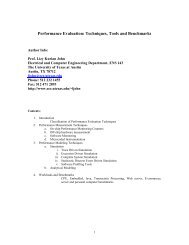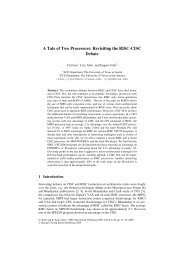Copyright by William Lloyd Bircher 2010 - The Laboratory for ...
Copyright by William Lloyd Bircher 2010 - The Laboratory for ...
Copyright by William Lloyd Bircher 2010 - The Laboratory for ...
You also want an ePaper? Increase the reach of your titles
YUMPU automatically turns print PDFs into web optimized ePapers that Google loves.
change. Two major issues were found: minimum OS scheduling quanta and<br />
increase/decrease filter.<br />
Per<strong>for</strong>mance<br />
100%<br />
80%<br />
60%<br />
40%<br />
20%<br />
0%<br />
Cannot change<br />
p-state faster<br />
than scheduling<br />
quanta<br />
1 10<br />
TimeCheck (ms)<br />
100 1000<br />
Figure 6.4 Varying OS P-state Transition Rates<br />
First, per<strong>for</strong>mance remains constant when scaling from 1 us to 10 ms (< 1 ms not<br />
depicted). This is attributable to the OS implementation of scheduling. For Microsoft<br />
Windows Vista, all processes are scheduled on the 10 ms timer interrupt. Setting<br />
TimeCheck to values less than 10 ms will have no impact since p-state changes, like all<br />
process scheduling, occur only on 10-ms boundaries. Second, even at the minimum<br />
TimeCheck value, per<strong>for</strong>mance loss is at 80 percent. <strong>The</strong> reason is that other settings<br />
become dominant below 10 ms. In order <strong>for</strong> a p-state transition to occur the workload<br />
must overcome the in-built low-pass filter. This filter is implemented as a combination<br />
of two thresholds: increase/decrease percent and increase/decrease time. <strong>The</strong> percent<br />
threshold represents the utilization level that must be crossed in order to consider a p-<br />
state change. <strong>The</strong> threshold must be exceeded <strong>for</strong> a fixed amount of time specified <strong>by</strong><br />
114<br />
Per<strong>for</strong>mance<br />
loss increases<br />
as p-state lag<br />
increases




